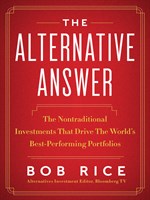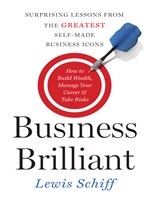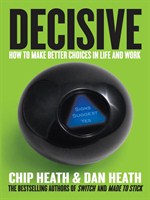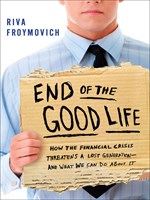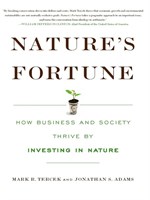business
July 3, 2013 - Etsy is an online marketplace where you can have fun and make money while indulging a passion for arts, drafts, vintage finds, fashion, and more. See how to set up a business on Etsy, then showcase your treasures, start a viral sensation, build a customer base, and turn a hobby into an enterprise. View a number of successful Etsy businesses and learn their recipe for success. Barrington Village Hall. Free workshop, please register here.
July 3, 2013 - If you missed the June 26 SCORE session "8 Steps - 90 Days To A Stream of New and Repeat Business" featuring Sasha Berson of Berson Business Development Company, you can view a recording of the presentation:
Don't miss any upcoming business programs - sign up for email announcements here. And get the whole range of library programs and events by subscribing to our quarterly newsletter here.
Many of our local businesses use our ReferenceUSA database to create targeted lists of companies and customers, but did you know that the library's subscription to LexisNexis can also help? Here's a quick overview on creating customized lists of companies to help your targeted marketing initiatives:
Our next guest blogger is Karen Chan, owner of Karen Chan Financial Education & Consulting, LLC and a featured presenter at our recent series of financial literacy programs as part of MoneySmart week. We asked Karen what consumers should look for when evaluating financial advisors. She gave us the following guidelines:
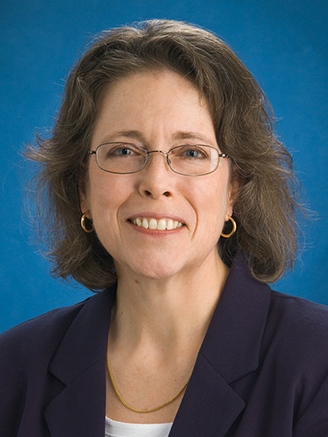
If I hire a plumber to install a garbage disposal, I can pretty quickly judge whether the plumber did a good job: Did it leak? Does the garbage disposal work? Did he damage anything else during the installation? Did he clean up and leave my kitchen in good order? Within a few days, I will probably know whether he did an acceptable job.
With financial services, it is usually much harder to evaluate the quality of the services you receive. Inappropriate investment recommendations may not be become apparent until years down the road. Even fraudulent investments may not be discovered until much time has passed, as was the case with Bernie Madoff.
Because it is hard to evaluate the quality of financial services, it is especially important to select your investment professional carefully. Unfortunately, this provides challenges, too.
The first issue is that, in the United States, we have lots of different labels for financial advisors. Some titles have clearly defined meanings, but many do not. For example, the term financial planner implies what the person does. But the term is not legally defined. As a result, insurance and annuity salespeople, brokers, investment advisors, and probably others all call themselves financial planners. But their qualifications, the services they provide, and products they sell or recommend can vary widely.
Two terms regarding investment professionals are defined by law: registered representative (which is the technically accurate term for a broker) and registered investment advisor. A registered representative has passed certain examinations and is licensed to sell certain investment products, determined by the examinations he has passed. The stereotypical idea of a stock broker is the person that you call when you want to sell your shares of IBM, or who calls you with a recommendation of a stock for you to buy.
A registered investment advisor is registered either with the state or with the Securities and Exchange Commission, and is authorized to provide investment advice. Historically, the investment advisor was the person who determined things like how much of your portfolio should be invested in stocks or bonds and other investment management decisions, while the broker executed the buy and sell orders to implement your plan. That distinction has become muddied over the years, and today many investors don’t know whether they’re working with a broker or an investment advisor. The two professions are held to a different standard of care in the services they provide. A broker must recommend investments that are suitable, but it is perfectly legal for him to take his own compensation and incentives into consideration when deciding which mutual fund or other investment to recommend. A registered investment advisor, on the other hand, is held to a fiduciary standard and must recommend only what is in the best interests of the client. That is a significantly higher standard than the suitability standard for brokers.
Today, some investment professionals are licensed both as brokers and as registered investment advisors. This makes it harder for the consumer to understand the nature of the relationship, and what standard the investment professional is following at any given time.
The issue of compensation adds another layer of confusion. The two general ways that an investment professional is compensated are commission and fees. Most people understand the concept of commissions: if you buy a product, the salesperson receives a percentage of the price you pay as his commission. Fees are also pretty easy to understand: if I hire this person to provide a certain service, I will pay a fee for that service. It might be hourly, or it could be a flat fee for the task. Think of how you hire a housepainter: you might pay by the hour or by the job. In either case, you’re paying a fee for the service.
Two similar-sounding terms describe dissimilar models of compensation. Fee-only advisors are compensated only by fees paid by you, the customer; they receive no commission and no consideration from any company whose products you purchase. Fee-based advisors, on the other hand, may charge a fee for their services, but they may also charge commissions or receive incentives or consideration from the company whose products they sell. The challenge for the consumer is not only to understand how the investment professional is paid, but also to understand any conflicts of interest that are introduced by the form of compensation. It is because of the potential for conflicts of interest due to how the person is compensated that much of the financial press suggests looking for a fee-only advisor. The SEC provides an excellent set of questions to ask your financial professional about how he is compensated (see the last page of the Investor Bulletin).
Another factor in evaluating a financial professional is education and training that is relevant to the services they provide. There are a multitude of designations used by financial professionals. Some require significant training and passing of stringent examinations; others merely indicate that the person paid a fee or participated in a short training. For financial planners, which includes many investment advisors, the Certified Financial Planner™ (CFP®) designation is one to look for. It requires five college-level courses and passing a two-day exam (which about 35% percent of people fail), and a few years of experience. The Chartered Financial Consultant (ChFC) designation from The American College and the Personal Financial Specialist (PFS) for CPAs indicate comparable levels of expertise, but with different focus: insurance for the ChFC and taxes for the PFS. All three of these designations required continuing education to retain the designation, and the designation can be revoked if the financial professional violates the ethics or other requirements for the designation.
In my previous work with University of Illinois Extension, a colleague and I developed Choosing a Financial Professional, a website designed to help investors understand these issues. It includes an interview guide to help investors evaluate and select a financial advisor. Trusting someone to make decisions about your money is an important decision. It’s worth taking the time to make an informed and thoughtful choice.
Karen Chan has been educating the public about financial topics for twenty years, first as a Consumer Economics educator with University of Illinois Extension and now through her own business, Karen Chan Financial Education & Consulting, LLC. She holds the Certified Financial Planner™ designation. She uses that training to teach rather than practicing as a financial planner. She presents on a wide range of financial topics, from basic money management to technical subjects such as strategies for maximizing Social Security benefits. Her goal is to make even complicated subjects easy to understand so that her workshop participants can make wiser decisions with their money.
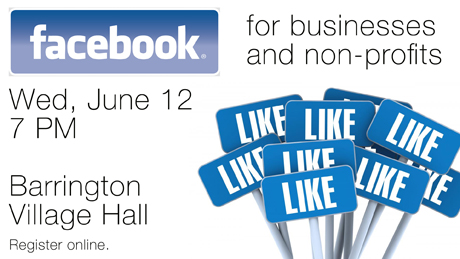 Are you using Facebook to grow your business? Want to reach out and build an online community for your non-profit or small business? Rachel Bloomberg tells you want to post, how to attract fans, and common pitfalls to avoid. Bring your laptop for hands-on, practical learning you can immediately apply. Barrington Village Hall. Register.
Are you using Facebook to grow your business? Want to reach out and build an online community for your non-profit or small business? Rachel Bloomberg tells you want to post, how to attract fans, and common pitfalls to avoid. Bring your laptop for hands-on, practical learning you can immediately apply. Barrington Village Hall. Register.
May 23, 2013 - Welcome to our second guest on this blog! Andrea Herran, Principal of Focus HR, is knowledgeable in the full spectrum of human resources activities. Her passion is in assisting small businesses achieve success through their people. She works alongside entrepreneurs, managers, and owners as a consultant, coach, or mentor. Andrea has lived and worked overseas in Mexico, Argentina, and South Africa.

We asked the popular presenter on HR topics the following questions:
What are some of your favorite HR resources for small business owners and operators (books, websites, magazines, etc.)?
In print there are limited resources. On the internet you can find much more and it is a matter of finding a style you are comfortable with - more casual, step-by-step or thought provoking and formal. There are countless blogs on Human Resources. My own blog, focused on practical and use now information for business owners, can be found at http://FocusHR.biz/blogging
What are a few of the most common mistakes you see small businesses making, and what advice would you give in order for businesses to avoid those mistakes?
The biggest mistake and the most costly (if you’re audited) is not having the proper paperwork for your employees. All employees, regardless of how many you have, need to complete an I9 form (http://www.uscis.gov/files/form/i-9.pdf) and read the instructions. Keep the form separate from the employee files. Place the proper posters on your wall where everyone will see them (http://www.illinois.gov/idol/EmployerInformation/Pages/posters.aspx) for State and Federal requirements. Lastly, W4 tax forms.
The other is not being clear on expectations. When someone comes to work for us, we give them some training and then expect them to live up to our expectations. This is wonderful, if the person knows what they are. Most times, we don't take time to write out what we expect a person to do - either generally or very specifically. For example: customer service person is to respond to all inquiries. This is what we tell people which is appropriate but you want the customer called back within a certain time frame. Tell them the time frame - 2 hours, 5 hours, overnight, etc.
What kind of leadership advice can you give women working for or running small businesses?
Be yourself. Don't feel that you have to compete in a man's way. You will gain more respect and clients by being you. Many times we think we need to act like our male counterparts or be "one of the boys". I have had more success by standing out as the girl in the group.
When leading others they can spot fake or someone who doesn't appear comfortable in their own skin. You have to find a leadership style that works for you and allows others to want to work with you. You can read all the leadership books, articles and blogs you like, take in the information and make it your own.
Any quick tips or hints you can give on improving internal (corporate) communication?
This is one of my favorite topics. You need to be able to write in a way that speaks to everyone. Regardless of what you are communicating remember to include the WIIFM (what's in it for me) for your reader. When writing to employees it is not about you, it is about them and why should they take an interest in what you are saying. Apply the information to them, tell a story and make it relevant.
On an individual note, acknowledge people for their hard work, great job or the way they handled a particular situation. While not everyone is looking for public recognition, a pat on the back or a handwritten thank you note can go a long ways.
May 16, 2013 - E-readers, check it out! We just added these business titles to our OverDrive collection.
Download these hot-off-the-press titles today...
May 14, 2013 - Welcome to the first in our new series of guest posts! Nathan Delack, owner of Delack Media Group, graciously answered some of our burning questions about videos for businesses. Thanks, Nathan!

What companies are known for great videos? (who should I be looking for on YouTube for examples)?
If you're looking for social media marketing inspiration, check out The North Face. They're constantly evolving their social platforms, which includes a huge presence on YouTube. Their channel (http://www.youtube.com/thenorthface) has over 1.6 million views with unique content that viewers want to share. Their videos not only include product specs but the brand also uploads lifestyle-related videos; featuring outdoor enthusiasts using their products in beautiful settings. They are creating a dedicated following by providing information the consumer wants without throwing a direct sales pitch.
University of Phoenix doesn't have a huge number of views or subscribers to their channel. However, that isn't important to their online marketing objectives. What's important to them is that they have at least one video that connects with a prospective student who searches for an online school or visits their channel.
http://www.youtube.com/user/UniversityofPhoenix
The Home Depot (http://www.youtube.com/user/HomeDepot) is a perfect example of how brands can use YouTube to educate their consumer base without being over-the-top in promoting specific products sold. By posting educational how to videos, The Home Depot is: establishing themselves as a trusted expert, indirectly promoting products/tools sold, and giving a personal face to a huge corporation.
Etsy (http://www.youtube.com/user/etsy), the online marketplace for handcrafted items, runs regular profile videos of its members on their YouTube channel. The message portrayed to the viewer through their "Handmade Portraits" series is that they care about their sellers. They also run "How to Tuesdays", where members share their advice frequently via video with other users.
What kind of equipment/software do you recommend for those just getting started with video marketing (and on a budget)?
It is possible to create online video content with a shoestring budget. The question to ask yourself is...will the videos I create match my company's current image and branding? You can easily create an online video with your iPhone on a tripod, iMovie, and a lavalier microphone. Video gear can also reach into the tens of thousands of dollars. So, it's important to set a budget and work within that budget for equipment purchases.
How can small businesses promote their videos, in addition to YouTube and their websites?
Definitely post your videos on your website. A video on your website makes your website look great. It's an instant eye-catcher and has been proven to improve user interaction on your site. If you already have social media fans, that's the perfect way to distribute your video content quickly and to the largest number of people. Facebook, Twitter, Pinterest, LinkedIn, and Google+ are all recommended avenues for onilne distribution. The video might catch one of your fan's eyes and they might share it with people you could never imagine reaching. Those people can share it with others and so on. This is all free advertising! If you have a blog, email campaigns or e-newsletters, embed your video in those as well. Industry blogs are always looking for content. Contact blogs specific to your industry and ask about their guidelines for submission. You can also put your YouTube URL on business cards, letterhead, and print/direct mail. If you want to get real creative, you can have your video looping on an in-store display, at a trade show/conference, or on a mobile billboard. The possibilities are endless and are completely up to your creativity!
What influences of ever-changing technology do you see in your field?
Technology is always changing. There's a new piece of equipment coming out every week. The way to distribute content is always changing. Vine, which is Twitter's video app, was just released about 100 days ago. I always encourage people not to get caught up in the gear. Focus on the content. Identify your audience and define how video can best serve them. Create meaningful content viewers will want to share. Develop an online video marketing strategy that best fits your industry and then ask yourself...what can I do to take this one step further?
Nathan Delack has over 20 years of video production experience and is an award-winning broadcast photojournalist and accomplished video producer, director, speaker, & instructor. Nathan has worked for various broadcast television stations within the top 70 DMA and has been responsible for creating thousands of television and internet videos. He’s received 7 Emmy and numerous industry awards for his broadcast television work. In 2009, he created Delack Media Group (www.DelackMediaGroup.com), which is based in Barrington, Illinois. Under his leadership, Delack Media Group has helped produce videos for clients ranging in size from small non-profits to large Fortune 500s.
May 10, 2013 - The library has lots of resume books on the shelf waiting for you. Take a look at these titles when polishing your resume to make sure your marketing materials stand out (click cover to place a hold):
Don't forget The Careers College database. Learning Module (LM) #3 discusses resumes and how your can make sure your information makes it to interview stage. Access this database at the library, or Barrington cardholders can sign in from home.
Our Adult Learning Center is also accessible remotely to Barrington cardholders (or at the library for everyone). Upload your resume to have it critiqued by a reviewer, and download their comments and suggestions the next day.
Illinois WorkNet also features a series of resume webinars, including one on preparing your resume. You can also download slides from ILWorkNet's last resume webinar here.
April 16, 2013 - Money Smart Week is almost here. Have you signed up for any of our special programs?
You can also tune in here on Saturday, April 20 at 9 am (CST) to watch Detroit Public Television's special Money Smart Week program Be A Money Smarty. Check back right here for the live webcast.
Created by Mark B. Robinson CIMA® AIFA® specifically for Money Smart Week, the Be a Money Smarty! presentation will be delivered in a high-energy ‘lightning round’ fashion, where 4 recognized experts ‘leave it all at the podium’ and share their ‘top 5 tips’ in just 10 minutes. Hosted by veteran television talent, Christy McDonald, this program will now be made available live, in real-time, via web stream, at 9:00 a.m. on Saturday, April 20th. In this entertaining and informative lightning round format, you’ll obtain the latest, up-to-date information on today’s hottest money topics, including how to:
- Establish-Use-Maintain Credit, Manage Debt; Michigan State University Extension Educator Erica Tobe.
- Avoid Scams, Fraud, Identity Theft; Michigan Department of Attorney General, Consumer Protection Division Chief Katharyn Barron.
- Understand Annuities and Long-term Care Insurance; New England Financial-a MetLife Company Managing Partner Mike Amine.
- Get Control Over Your Money, Now: Mark B. Robinson, CIMA® AIFA® is the Be A Money Smarty! developer and moderator.
Free to view and free from sales pitches, you’ll receive top-notch information from a source you can trust; and no one will try to sell you anything! Developed and presented by Mark B. Robinson CIMA® AIFA® along with experts in debt, credit, housing, annuities, long-term care insurance, scams, identity theft and investment fraud, Be A Money Smarty! will be sure to entertain and inform. Tune in and get smart quick!
As a production of Detroit Public Television, the Be A Money Smarty! program will be made available for free on Saturday, April 20th at http://www.dptv.org/moneysmarty
- Pizza with Nick!
- Make sure you're "leaning in"...
- Electronics Recycling: Saturday, March 9 in Barrington (Langendorf Park)
- Resume help from Illinois WorkNet
- New business books in Overdrive
- IRS tax assistance for small businesses
- Tips for attending job fairs from Illinois WorkNet
- Become a twitter expert!
- Something for everyone...
- How the Cloud can benefit your business:


